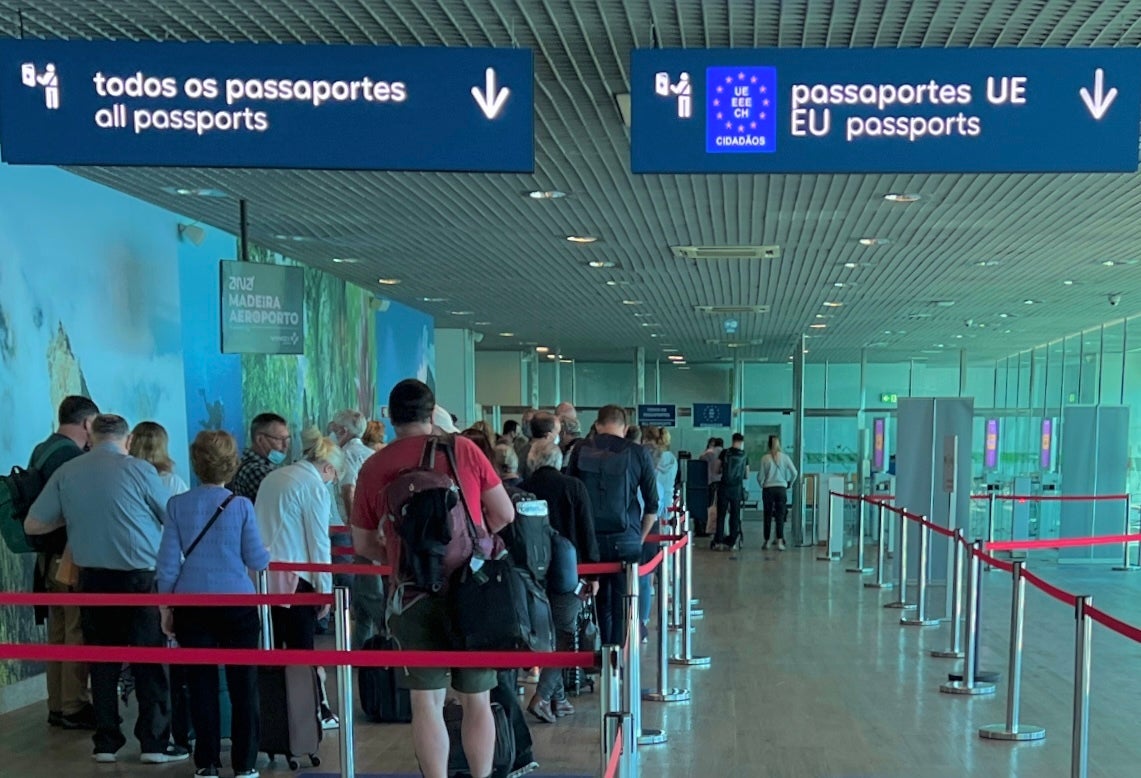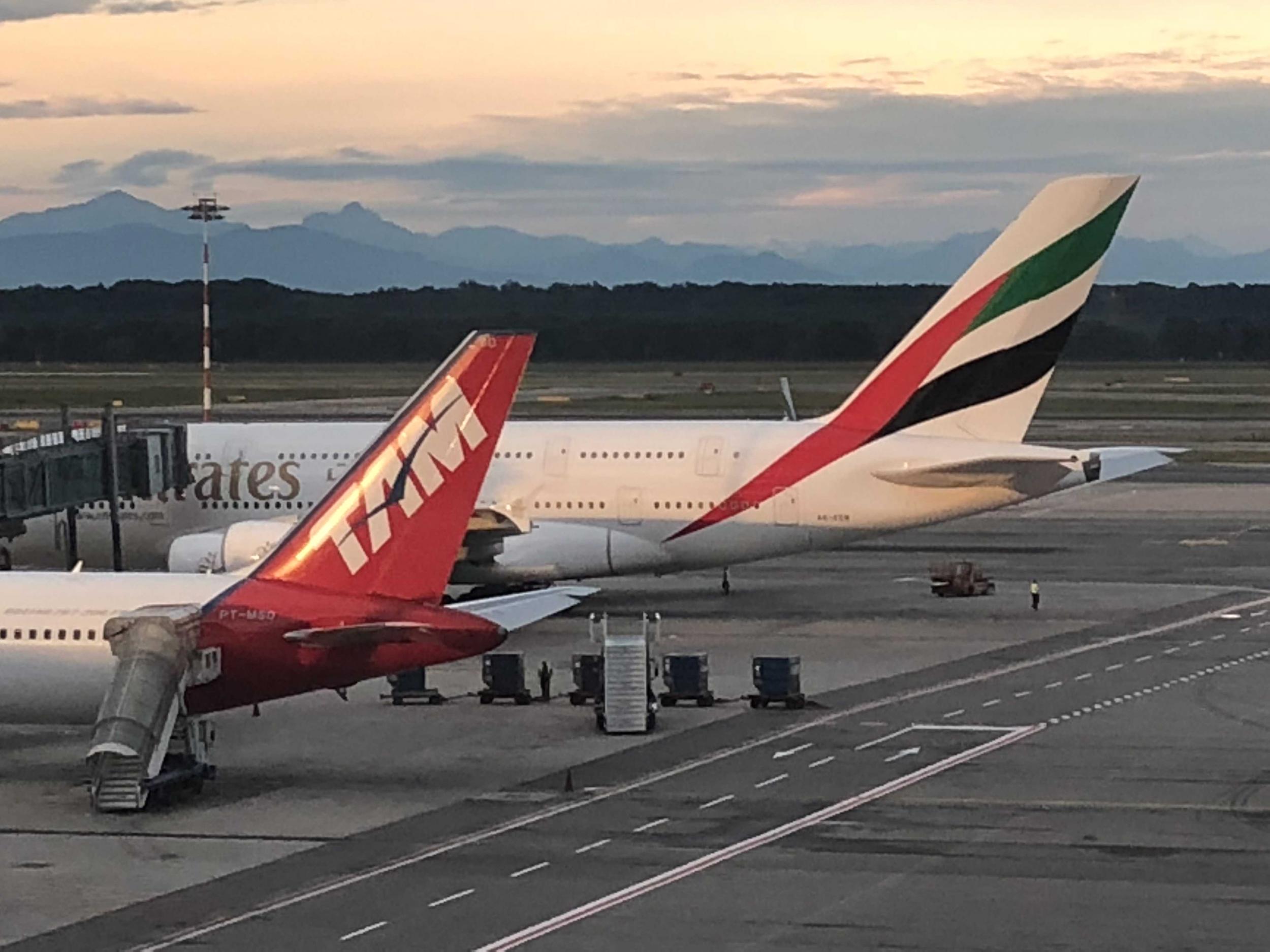“It takes a surprisingly short time for an airport, which is normally working very well indeed, to completely collapse,” warns aviation economist Oliver Ranson.
If that happens, “people simply can’t fit into the arrivals hall, so planes have to be held at the gate with passengers on board.”
Ranson has analysed airport flight patterns to see which will be most susceptible to disruption when the EU’s entry-exit system begins on 12 October.
The three European airports most at risk of passenger gridlock, he believes, are Athens, Bucharest and Milan Malpensa. Mr Ranson told The Independent’s daily travel podcast: “Maybe even some flights will have to be diverted or cancelled because an airport can’t accommodate them.”
The EU’s much-delayed plan will require the British – and many other nationalities – to provide biometrics when crossing in or out of the Schengen area – comprising the EU except Ireland and Cyprus, but plus Norway, Iceland and Switzerland.
All travellers must undergo an initial registration, providing a facial biometric and fingerprints (though under-12s need not supply the latter).

Many EU airports, including Athens, have already installed kiosks in the arrivals area to enable these biometrics to be taken from “non-Schengen” arrivals. Flights operating wholly within the area are regarded as domestic, with no need for extensive red tape.
But trials suggest that processing passengers at entry-exit system (EES) checkpoints could take up to four times longer than at present. During the 180-day roll-out, which is due to end on 9 April 2026, British travellers face “double red tape”. Alongside a request for biometrics, passengers must submit their passport for checking and stamping by an border officer.
The EU has shied away from a proposed “big bang” approach – imposing the system at all Schengen borders overnight – and is now asking member states progressively to introduce the entry-exit system. In addition, at crossing points where queues build up, authorities will be allowed to let up to 90 per cent of travellers swerve the EES requirements.

Even so, says Oliver Ranson, there is scope for serious disruption at the best-run airports: “Their terminals, their arrivals halls, their IT are all designed and optimised so that when planes are arriving on time, when they’re leaving on time, and when people are coming into the arrivals hall at the rate which expected and well understood and are quickly processed, everything goes smoothly.
“That doesn’t mean that you’re not going to have to queue a bit. Airports and airlines expect that there are going to be queues at some times of the day. They just can’t build an arrivals hall which is big enough and employ enough staff to get everybody through without waiting. But hopefully, most of the time people don’t have to queue for too long.
“The problem is that when things do start to go wrong and when new systems like the entry exit system are introduced, unexpected niggles can make the overall arrivals process get very gnarly very quickly.”
Surprisingly, airports that have a smooth flow of arrivals from non-Schengen locations throughout the day are most at risk – because there is no “recovery time”. In contrast, airports with a series of peaks and troughs are more likely to cope.

“If you have nobody else coming to join the queue afterwards, if there’s a bit of a problem and it takes longer for the immigration officers to process, then there might be longer queues than normal. But as long as there aren’t too many people coming in afterwards, then eventually everyone will get through. When the next set of planes arrive – three, four or five hours later – the arrival hall is nice and empty, and the process can start again.”
At Athens, Bucharest, Milan Malpensa and other airports including Budapest and Berlin, non-Schengen arrivals are evenly spread.
“If, for whatever reason, the immigration officers feel that this emergency, “one-in-10 check” is not feasible, then there’s simply no opportunity for the queues to dissipate, and that’s going to lead to big problems,” Mr Ranson said.
“There’ll be too many passengers coming in, the queues will not go down quickly enough. Eventually, planes aren’t going to be allowed to arrive anymore. And when planes can’t arrive anymore, or if they’re held at the gate for a long time, that means that flights going back out from the airport are cancelled. So even people who are not arriving in the Schengen area, but leaving it, might find that their flights are disrupted.”

The two EU airports with the highest proportion of non-Schengen arrivals are Paris CDG and Faro, the gateway to Portugal’s Algarve. But Mr Ranson said: “These airports are finding their non-Schengen arrivals clustered at various points in the day. If there’s a problem, the queues will still have time to dissipate.
The airport named as least likely to encounter problems is Palermo in Sicily, because it has waves of non-Schengen arrivals. After the early morning touchdown from New York, there is a break of around three hours before several planes from the London area arrive. Subsequent flights from outside the Schengen area are spread out with gaps of two or three hours.
The economist, who writes the Airline Revenue Economics blog, said that airlines and airports have to choose whether to “have things easy in times of disruption” or operate close to full capacity with little slack in the system.
“This is actually a very difficult choice to make if you’re an airline executive or an airport executive,” Mr Ranson said. “You can’t have the best of both worlds. You can’t have a world which is optimised for both normal operations and disruption.”
The Independent has asked Athens airport for a response.
Most vulnerable airports to disruption if difficulties arise with the entry-exit system:
- Athens
- Bucharest
- Milan Malpensa
- Budapest
- Berlin
- Vienna
- Rome Fiumicino
- Amsterdam
- Copenhagen
- Prague
Source: Airline Revenue Economics
Read more: What will the EU’s new entry-exit system mean for British travellers?




